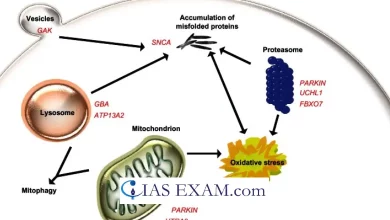New Dietary guidelines of ICMR
Syllabus: Government Policies and Interventions [GS Paper-2]

Context
The Indian Council of Medical Research (ICMR) has recently released 17 dietary guidelines to address the significant burden of noncommunicable diseases (NCDs) fueled by unhealthy diets. According to estimates, a staggering 56.4% of the total disease burden in India stems from poor dietary habits.
Key Points
- Unhealthy Diets and Disease Burden: According to the ICMR, 56 percent of the respondents either smoked or used to smoke. There is 1.5 – 2 times more of undernourishment and one in four deaths worldwide are now linked to dietary risks.
- Guidelines Overview: The guidelines work in line with supplying the essential nutrients and curbing Non communicable disease (NCD) including obesity & diabetes.
- Protein Supplements: The ICMR cautions against the consumption of supplements such as protein as they may contain added sugars and artificial flavourings which cause problems when not taken in moderation. The ICMR dispels the myths about proteins as many people believe that large amounts of protein are necessary for health.
- Healthy Lifestyle: They are the most essential ways by which lifestyle is affected the prevention of obesity and other related issues on health.
- Food Safety and Choices: Suggestions consist of taking the healthy options such as thinking about non-processed foods and understanding the labelling`.
Dietary Guidelines
The guidelines, drafted by a multidisciplinary committee of experts led by Dr. Hemalatha R, Director, ICMR-NIN, aims to provide scientific evidence based information to facilitate the attainment of goals stated in the National Nutrition Policy. The 17 guidelines emphasise the importance of:
- Healthy Diets: A balanced diet should offer more than 45% from cereals or millet and up to 15% from pulses, beans, and meat of which the rest is nuts, vegetable, fruit and milk.
- Physical Activity: Unfailing running, biking, swimming etc. may curb the development of non-communicable diseases.
- Restricting Salt Intake: Ensure salt is only consumed in moderation to minimise hypertension risk associated with cardiovascular diseases.
- Moderate Oil and Fat Consumption: Use oils and fats in moderation to prevent excessive calorie intake.
- Minimising Sugar and UltraProcessed Foods: Restrict sugar inwards to fewer than 5% of energy consumption and be rice husk from ultra processed foods.
- Avoiding Protein Supplements: Do not take protein supplements for your bulked mass if you regularly use them for more than five or six weeks because both your bones and kidneys can get damaged.
Importance of Dietary Guidelines
The dietary guidelines are pivotal for dealing with the rapidly threatening non-communicable diseases (NCDs) in India. The concept of a healthy lifestyle involves dietary balance and regular physical activity which can help in lowering the primary NCD risks such as obesity, diabetes, coronary heart disease and hypertension.
Conclusion
Therefore, the ICMR’s issue of the 17 dietary guidelines is essential institutions in confronting the magnitude of NCDs in India. The guidelines include having a well balanced diet, engaging in regular physical activity, and limiting salt, sugar and ultra processed foods intake. Observing these rules will enable people to mitigate the danger of contracting NCDs as well as improve their general health and wellness. The second thing is that the legal guidelines can guide policy measures and relevant health campaigns in prevention of NCDs in India.
Source: Livemint
UPSC Mains Practice Question
Q. Discuss the significance and implications of the Indian Council of Medical Research’s (ICMR) new dietary guidelines for promoting public health and nutrition in India. Analyse the key recommendations outlined in the guidelines and their potential impact on addressing prevalent health challenges such as malnutrition, obesity, and non-communicable diseases (NCDs).





.png)



